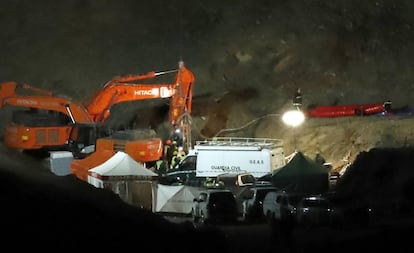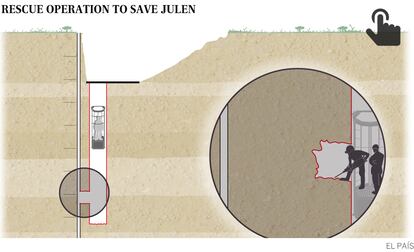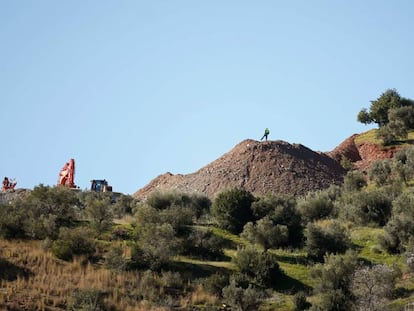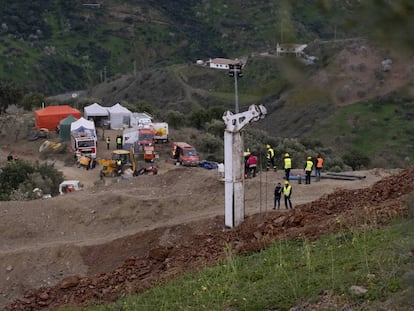After 13-day search mission, body of Julen Roselló located in borehole
The two-year-old was found at 1.25am local time on Saturday morning. The rescue efforts faced constant delays due to the nature of the terrain and the difficulty in reaching the area

The huge efforts made by rescue teams turned out to be in vain. Julen Roselló, the two-year-old boy who fell into a borehole in Totalán, Málaga, on Sunday January 13, was located dead on Saturday at 1.25am, after an intense 13-day search mission.
The emergency services began the judicial process to remove the corpse in the early hours of Saturday, after the family of the young boy were informed of the grim discovery.
“At 1.25am, the rescue teams accessed the point of the borehole where Julen was believed to be and they located the lifeless body of the youngster,” read the message that was conveyed by the subdelegation of the central government at 2.21am, to more than 100 media outlets. “The judicial commission has been set up.”
Julen had fallen down the 110-meter-deep borehole while playing on the land of a relative in Totalán, Málaga. The alarm was raised by two passing hikers, who were alerted by the screams of his family once they realized what had happened. Initial efforts to reach the child in the hole by the authorities were frustrated by a plug of earth around 70 meters down, but the cup and snacks he was carrying at the time of the fall proved that he was in there, as well as positive DNA tests on hair that was pulled out of the well.
The rescue efforts were constantly delayed over the last 13 days by the difficulty of the terrain where the borehole was located
After the team of specialist miners sent down a parallel tunnel broke through into the borehole, and discovered the lifeless body of Julen, a team from the Civil Guard made its way to the home that a family in Totalán had lent to the parents of the child, Victoria García and José Roselló. They were accompanied by family members and friends who had traveled from all over to be with them. A Civil Guard vehicle with its flashing lights on suggested that news was being delivered inside the property, catching the attention of the 40 or so people who were in the village to show their support for Julen’s parents.
They congregated outside the house in silence in the middle of the night, at around 2am. It was then, half an hour before the government officials confirmed the death, that sobs coming from the house and hugs between family members outside saw the news spread that the child had been located.

The rescue efforts were constantly delayed over the last 13 days by the difficulty of the terrain where the borehole – which had been dug in search of water, but apparently not properly covered up – was located. A Civil Guard officer was the last person to take part in the rescue effort, after members of the specialist Mining Rescue Brigade managed to open up a four-meter gallery that ran horizontally between the specially excavated rescue tunnel, and the borehole where the child was thought to be located.
The work of the brigade, which began on Thursday afternoon, was long and arduous. To reach Julen’s body they had to cope with a number of obstacles and take huge security measures. They even had to resort to small explosive charges in order to get through the rock. They also had to wait for a range of issues to be solved before the rescue tunnel could be properly shored up. In the end, their rescue efforts were in vain.
In the first days of the operation, several other options were considered. The alternatives included a horizontal tunnel made by a small boring machine, but several problems during the initial work, in particular landslides, led the teams to opt for a vertical rescue tunnel parallel to the borehole. Two tunnels were initially planned, but in the end the rescue teams opted for just one.
The Civil Guard has begun an investigation in a bid to reconstruct the facts, “as would be done in any other disappearance
The Civil Guard has begun an investigation in a bid to reconstruct the facts, “as would be done in any other disappearance,” according to sources from the force. A local court has also begun a probe into exactly what happened.
The rescue efforts have been coordinated by Ángel García Vidal, the delegate from the School of Road Engineers in Málaga, and who worked side by side with the School of Mining Engineering and the Civil Guard on the mission. He had hopes that Julen would be found alive until the very end.
The three local administrations – of the central, regional and provincial governments – worked with the support of the Totalán local council. In total, around 300 people made up the rescue effort, including firefighters, the 112 Emergency Service, Civil Protection, the Civil Guard, National Police and technical teams from private companies.
Julen’s parents, José Roselló and Victoria García, are well-known residents of the neighborhood of El Palo, in Málaga, located at the foot of the mountains where Julen disappeared. In 2017, they lost their other son, Óliver, when he was three years old. He died unexpectedly of a heart attack while the family was walking along a beach, according to residents of the neighborhood.
English version by Simon Hunter.












































